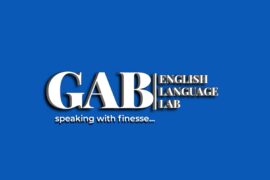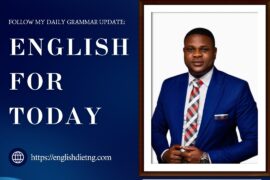The Reality of Life in Advanced Grammar: An Insight into Michael Alexander Kirkwood (M.A.K.) Halliday’s Functional Linguistics
Ganiu Bamgbose, PhD.
Theories are postulated empirical procedures for the explanation of academic and social phenomena. A theory presents a set of norms for explaining the workings or workability of human experiences. Linguists are divided mainly along the formalist and functionalist schools/perspectives/theories; with Noam Avram Chomsky as the enigmatic academic phenom in the former and M.A.K. Halliday as the celebrated name in the latter school (although scholars preceded both of them in the fields).
It is essential to state that language, at a time, was not an independently studied field of knowledge but was considered a tool for philosophical inquiries. This was the days of prescriptivism when language use was prescribed and proscribed. This was the age you would “humbly beg to apply” and not “write to apply” for a job as dictated by language purists. The age of descriptivism ushered the study of language for its own sake and the business of a linguist was no longer to dictate how language should be used but to account for how language is being used. Notwithstanding this descriptive development, language study still owes a lot to the mother discipline of Philosophy– which studies life and living in entirety.
Moving forward, this piece sets out to achieve two connected purposes of explaining an aspect of Halliday’s linguistic theory and relating it to life. The aspect to be considered is CATEGORIES.
At inception, SFG was known as SCALE AND CATEGORY GRAMMAR. It was a two-face account for the nature of language. The scales are: rank, exponence, delicacy and depth while the categories are: unit, structure, class and system. I will briefly relate each of the items under the category to my conceptualisation of human reality.
Unit is a stretch of language which carries a particular pattern. The grammatical units of language are: sentence, clause, phrase/group, word and morpheme. I will liken unit to where every human being belongs in life. As a human, you have to belong to a describable unit of existence/profession: seek knowledge or acquire a skill in line with the expected attitudes and values. This is the core of education: the acquisition of knowledge, skills, attitudes and values which make one a functional human being.
The next category is structure and this explains or accounts for the internal composition of each unit. The structure of the sentence is: alpha, beta, gamma, delta and so on. The clause is represented as: Subject, Predicator, Complement and Adjunct. The structure of the phrase is: Modifier, Head and Qualifier. Word is given as base plus affix while morpheme is often structured into prefix and suffix. Real life experience demands that every human being understands the internal workings of any field she or he belongs to. The organogram of any field is a requisite for any professional who wants to perform well on the job.
Class deals with the classification of each unit. The sentence has its structural and functional types; the clause can be either dependent or independent; the groups are nominal, verbal adjectival, adverbial and prepositional and the words split into the content class (nouns, verbs, adjectives and adverbs) and function class (determiners, pronouns, conjunctions, prepositions and interjections). This confirms that there are always classes in life. One must know what class s/he belongs to in life and learn to grow in his or her class. This can be likened to the need to specialise in all that one does.
The last category which birthed my insight for this piece is system. Halliday conceives of language as a set of options from which a choice can be made. A sentence can either be in the active or passive voice, a verb may either be transitive or intransitive, an adjective may either be in the comparative or superlative form. These are few of the many systems found in language. This tells us that life will always present to us a set of options. It is your choice what to make out of life.
(c) 2020 Ganiu Abisoye Bamgbose (Dr GAB)


1 Comment
Dr.Gab,
You are really an insight of knowledge for every human beings.Thanks so much for relating Michael’s works with the reality of life.It’s really well explained with the forms of “Category” where we have the unit, structure,class and system.